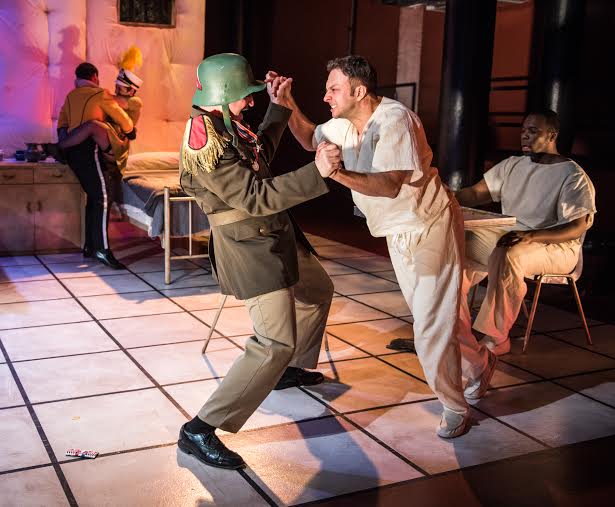

The fact that Georg Büchner never completed Woyzeck has given other artists the liberty to use the premise as a template to explore their own particular obsessions, with some choosing to “respect” the piece and adhering to what they think the author’s intentions were, and others reshaping it until it becomes completely amorphous. Somewhere in between lies Woyzeck, FJF, an adaptation by Jeremy Duncan Pape & D.L. Siegel, which takes all the characters and tosses them into a claustrophobic nightmare as inspired by the Romanticism as it is by David Lynch.
James Kautz of The Amoralists plays Woyzeck, a soldier interned in an asylum for the insane, seemingly without having received an appropriate diagnostic. As he plays a silent board game with his roommate Andres (Israel McKinney Scott), Woyzeck receives a daily visit from his doctor (Alessandro Colla) who checks his pulse and comments on his patient’s tendency to “think too much”. What seems at first to be a case of erroneous hospitalization, proves slowly to be founded on Woyzeck’s visions, which help the audience, presumably make sense of the demons haunting the young man.
He is visited by three apparitions, his lover Marie (Evangeline Fontaine), the captain (Jason Wilson) whom he once served, and the Drum Major (Mackenzie Knapp) who just might have stolen Marie’s affections, which led him to the crime of passion for which he was committed to the institution. As directed by Pape, Woyzeck, FJF, is bold enough to allow multiple interpretations and possibilities of what might have actually happened, as it suggests that Woyzeck might have also murdered the captain and the major.
Anxiety materializes throughout the show, as the visions appear unexpectedly from behind the audience, from the sides of the stage, and sometimes just through sounds, whether in song form or as narration. In a way, Pape’s execution seems to be an essay about the multiple possibilities offered by Büchner’s text, all of which lead to different roads. On one side there is a dichotomy between science and war, which suggests that they thrive in each other’s presence, in the very same way each other’s existence becomes threatened by a corresponding imbalance of power between them. Another reading suggests that an overpowering intellect can destroy the ability to love, a theory which can also be inverted to proclaim that too much emotion makes “less of a man”.
Woyzeck, FJF, is also commendable for its use of visual references which go from Chaplin-esque comedy, to expressionism so strong, we might very well be watching a live adaptation of The Cabinet of Dr. Caligari. The exceptional ensemble becoming a vessel for the whims of the play, which like its main character seems to always be on the verge of losing control, only to convince us that in fact, it had decided its own fate long before the curtain rose.